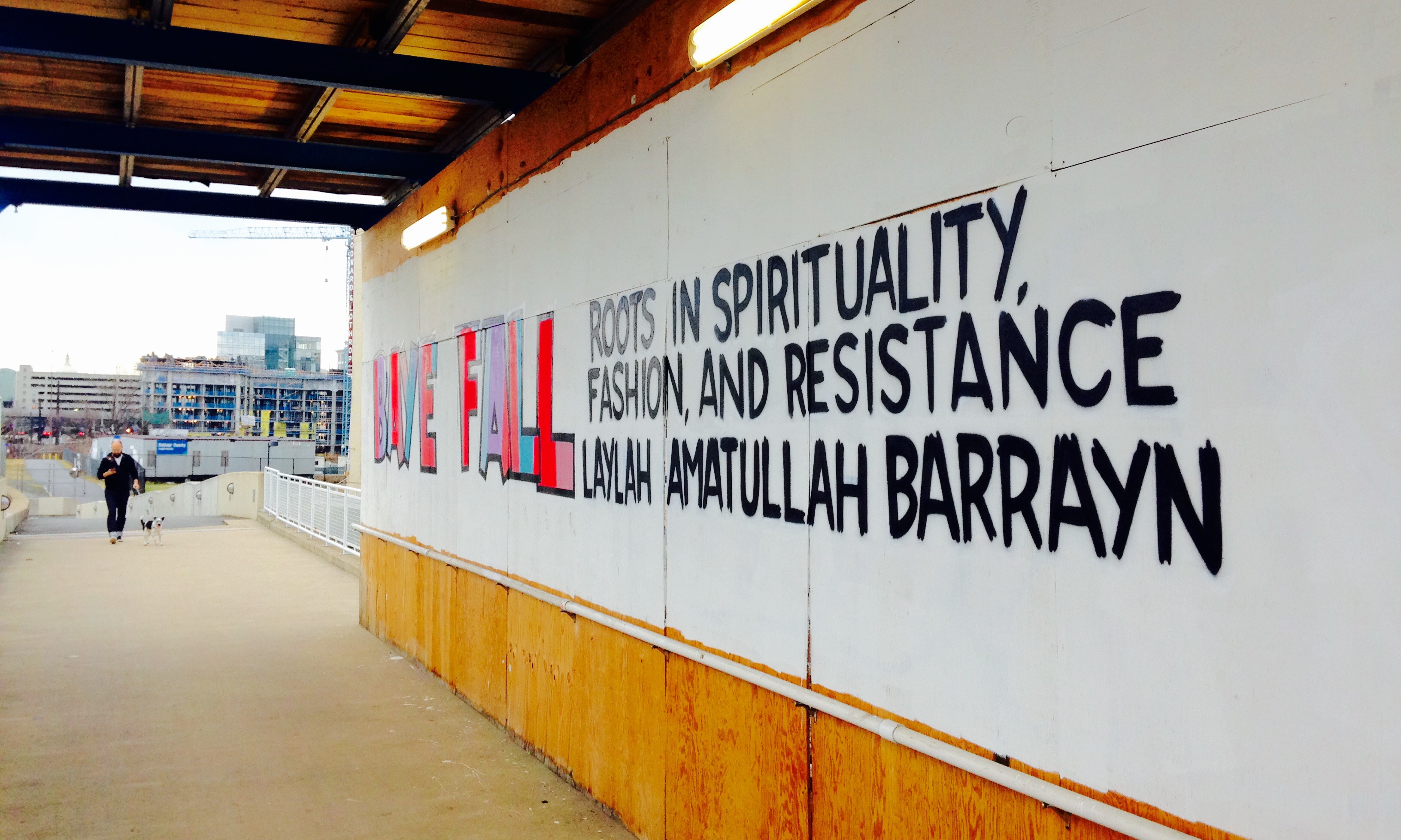Spirituality. Fashion. Resistance.
One sees many things while biking in Washington, D.C., but these three words from a mural (pictured above) jumped out to me immediately. I suppose that was the artist’s intention, and it worked, provoking me to even make a full stop and take a picture.
Beyond the portion in the above photo, the mural stretches on down the bike trail with 12 or so portraits of Africans in colorful dress, with big smiles or sometimes serious faces. (You can see those photos here in an article by the Washington Post.) All of this is a work of photojournalism by Laylah Amatullah Barrayn, who traveled to Senegal to capture images of the group Baye Fall. Lest you confuse the name, as I did, with an upstart indie rock outfit, they are in fact an African Sufi sect seeking to practice a more mystical Islam, apparently very fond of coffee, wearing leather talismans, ritual dancing, chanting in harmony, and stressing in their own quasi-Benedictine manner the “importance of a humble lifestyle and manual labor.”
I’d like to consider the above trinity of key words—spirituality, fashion, and resistance—instead of offering an assessment of Sufism, as I have zero qualifications or background to do so.
Is my own way of life spiritual? I believe so. I pray in community four times each day, as well as private meditation and rosary. At a minimum, I’m at least making an effort!
Is it meant to make a fashion statement? Yes. I’m a Dominican friar. Our clothing is 800 years old and gawked at a bit every time we leave the house and walk out into the world. It’s meant to make a statement, something along the lines of, “Yes, passersby, these sorts of people do still exist.”
Is it a life of resistance? That’s a more subtle question, I think.
For the members of Baye Fall, one description of their life recounts how “indigenous ideology and pre- and post-colonial politics have influenced their contemporary spiritual practice… as well as their social, economic and political philosophies.” The world is changing around them—around all of us—and do we welcome or resist? It’s a universal question of balance.
From a Christian lens, I would name, however, two immediate differences from this notion of resistance.
First, resistance for us is first a spiritual matter, not a societal one. Paul says to “put on the full armor of God, so that you can take your stand against the devil’s schemes. For our struggle is not against flesh and blood, but against… the powers of this dark world and against the spiritual forces of evil in the heavenly realms” (Eph 6:11-12). He names the enemy right there: the devil. This isn’t a notion of the past. Pope Francis very beautifully stresses the mercy of God, but he likewise constantly and openly warns against the devil. Not in general, but as a daily personal battle.
Remember also that Jesus was baptized in the Jordan, begins his public ministry, immediately goes to the desert, and has a one-on-one meeting with the old man himself. The stakes are clear from the start, and we see it is not a what but a who that is the root of the world’s problems.
Second, resistance is real but not primary. I recently mis-prayed during Mass: “We proclaim your death, O Lord, and protect your resurrection…” Ok, apologetics to our neighbor have their proper place, but when the enemy is a spiritual principality, it is God who protects us, not the other way around.
It is the predictable way of members of every social movement to resist an opponent as much as they defend something they love, if not more so, when hatred eclipses any other motivation. It is the unprecedented way of Christianity which demands that love must be first. The Church is more maternal than political, that all-at-once nagging and nurturing entity, with the same incessant demand: “You shall love the Lord your God with all your heart, and with all your soul, and with all your might” (Deut 6:5).
Only His love makes us strong enough to resist someone strong enough as the devil.
✠
Photo by Br. Timothy Danaher, O.P.







